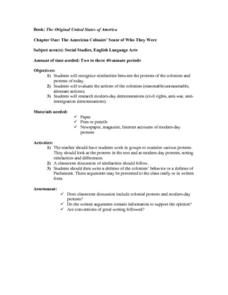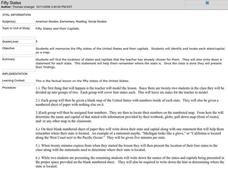Curated OER
Write It, Read It, Solve It
Writers create an original mystery and have a chance to put it into movie format. The classic elements of a mystery must be present: the crime, the suspects, the motive, the solution and clues. Use iPhoto and Quicktime Movie to integrate...
Curated OER
Message in a Bottle
Students acquire a pen pal in a foreign country and write letters at least twice a month throughout the year to exchange with them. At the end of the year, they write an essay that compares one important difference and one important...
Curated OER
Book: The Original United States of America
Students, after reading Chapter One in the book, "The American Colonies' Sense of Who They Were," analyze the actions of the colonists as well as compare the similarities between the protests of the colonists and protests of today. They...
Curated OER
Four Foot Feat
Students examine cultural customs and practices in family histories. For this family history lesson, students read the poetry in 'All the Colors of the Race' to analyze the family history. Students complete guided reading activities....
Curated OER
Meet One Picky Bird
Young scholars complete a research project In this endangered species lesson, students use the "Think, Puzzle, Explore" method to learn about endangered species. Young scholars research and write a report on the red-cockaded woodpecker.
Curated OER
Ants
Students make sequential patterns by using ants and following the model. They identify different parts of an ant by matching the picture to the word name. Pupils identify the ant's life cycle by creating a chart using pictures.
Curated OER
Analyzing Photographs: From Theory to Practice
Students analyze photographic images and use cameras to document their own life. In this analyzing photography lesson, students apply formal analysis techniques to images, then create a documentary of photographic images with artist...
Curated OER
Huguenot Street
Third graders visit Early Huguenot Street and identify architectural structural and design elements that were in use before 1720. They consider how architecture has evolved and complete Venn diagrams with their observations.
Curated OER
Family Stories and Personal Narratives
Fourth graders read various stories in their literature books about families. Individually, they make a timeline showing the most important events in their lives. They bring in one artifact from their lives and write a paper about it...
Curated OER
Children's Literature Meets Learning Theories
Students examine learning theories and principles through children's literature. In groups, they select theories and create multimedia presentations exemplifying them. Students discuss the various themes related to human growth,...
Curated OER
Tidepool Island Biogeography
Students experience and test island biogeography ideas by comparing diversity and abundance of rocky inter-tidal patches. Working, in groups of three, they investigate rocks and creatures found in a tidepool. Lesson plan designed for...
Michigan Sea Grant
Exploring Watersheds
Collaboratively, students partake in a hands-on activity in which they build models of a watershed. Each group member draws an elevation map—a bird's eye view—of their model and predicts how water will flow from the high to low points....
Curated OER
What is Economics? An Economic Board Game
Pupils learn the fundamental concepts of economics as it relates to government.
Curated OER
Vital Signs
Students research health-related topics such as good nutrition, exercise, and the human body. They analyze their data and distribute it through the use of the Internet.
Curated OER
Fifty States
Fifth graders find each state and its capital city on a map before memorizing the information. They work in small groups after watching a modeled activity by the teachers. They write a statement about their assigned states and capital...
Curated OER
Inferring Themes
Fifth graders practice making inferences on various types of reading material. As a class, they develop a definition of the word "theme" and discuss themes for some of their favorite stories. They use the context of the reading...
Curated OER
Workers on Sea and on Land
Students use photos of sailors and workers in the shipbuilding industry as a reference point to generate questions and investigate the working conditions for resource industry workers in 19th and 20th centruy Atlantic Canada and the...
Curated OER
Moose Traveler
Students collaborate and write a story about a Moose that travels across country. The adventure would take place in their state and each chapter would include information about the state. Other schools across the states could participate...
Curated OER
Choose Your Own Adventure
Students investigate the historical underground railroad. They also access technology to conduct research and write stories with the railroad as part of the historical fiction. The cumulative assessment is the creation of a book that...
Curated OER
Philanthropy in Literature Lesson 2: Common Good
Students listen to a number of children's books that describe private citizens participating in acts of kindness, sharing their time, talent or treasure. They identify the characters, problems, and solutions in the books.
PBS
Pbs Learning Media: Kindness in the Classroom: Kindness Curriculum: Social & Emotional Learning Competencies
The Kindness Curriculum addresses the Social Emotional Learning Competencies from the Wisconsin Model Early Learning Standards in the areas of Self-Awareness, Self-Management, Focus Attention, Social Awareness, and Relationship Skills....
Other
Social Psychology Network: Jigsaw Classroom
The "official web site of the jigsaw classroom",- a cooperative learning technique which was developed by Elliot Aronson. The jigsaw approach is considered to promote better learning, improve student motivation, and increase enjoyment of...
PBS
Pbs Learning Media: Asu: Compass for Courage
COMPASS uses collaborative game-based learning to teach youth research-backed strategies to manage worries, solve problems, build relationships, and face stressful situations with confidence. This six-lesson plan has shown to improve...
Edutopia
Edutopia: How to Use Play for Learning
Play is a primary and integral mode through which children make sense of the world, and that it is essential to their development and well-being. This article offers ideas on how to balance play and academic expectations in your classroom.























